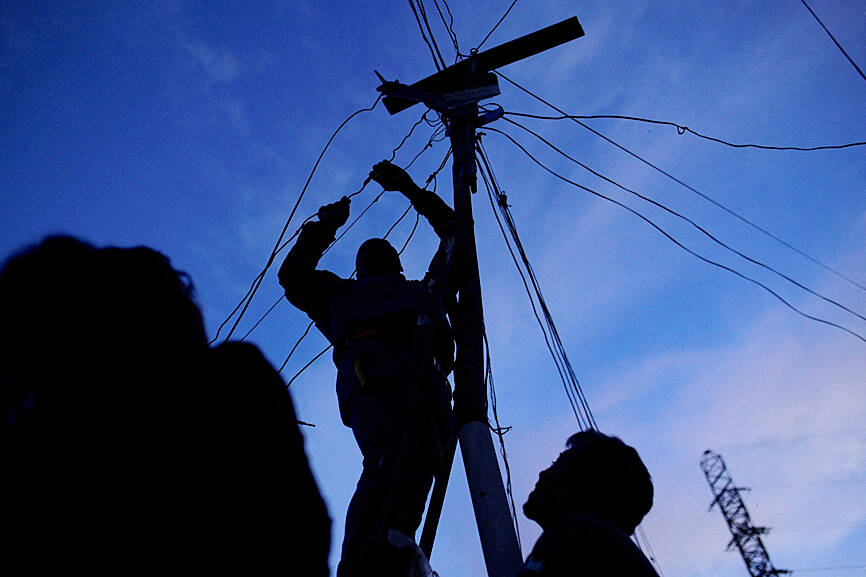Power was gradually returning to Venezuela on Friday after a nationwide blackout that authorities blamed on sabotage of the national electrical grid.
The nation experiences frequent blackouts, although rarely on such a large scale, which Venezuelan President Nicolas Maduro’s government routinely attributes to conspiracies to overthrow him.
Authorities reported the outage across 24 states began shortly before dawn, but by late afternoon correspondents reported power began to return to parts of Caracas, the southwestern state of Tachira and western Merida.

Photo: Reuters
“We are normalizing, regularizing, step by step,” Maduro said on television on Friday evening, without specifying the extent of the outages or recovery.
“This is an attack full of vengeance, full of hatred, coming from fascist currents relying on political sectors pretending to be the political opposition,” he said, alleging US involvement.
Earlier, Venezuelan Minister of Communications Freddy Nanez reported “an electrical sabotage ... which has affected almost the entire national territory.”
Opposition leaders and experts reject the Maduro government’s conspiracy claims, instead blaming corruption and a lack of investment and expertise for the outages. The worst countrywide outage to strike Venezuela, in March 2019, lasted several days.
“It’s complicated to get around without electricity. We don’t know what’s going to happen during the day,” said Anyismar Aldana, a 27-year-old cashier on her way to work in Caracas.
When the power goes out “we don’t work, we don’t know what to do for food,” Aldana said.
Western regions such as Tachira and Zulia have daily power outages.
“We woke up to the blackout,” said Carlos Pena, 39, owner of a small chicken shop in the center of Caracas who went to work to “see if we can sell everything so that it doesn’t go to waste.”
Nanez said the government had put in place “anti-coup protocols” after the blackout, citing the recent July 28 election — the result of which has been widely disputed.
Maduro was proclaimed the winner, but the Venezuelan National Electoral Council has refused to release detailed data to verify the result.
The opposition says its candidate, Edmundo Gonzalez Urrutia, won the election by a landslide, releasing polling station-level data to back up that claim.
Gonzalez Urrutia on Friday ignored a third summons to appear before prosecutors over his claims he was the rightful winner of the vote.
Prosecutors said if he failed to appear an arrest warrant would be issued.
Gonzalez Urrutia is accused of “usurpation of functions” and “forgery” for the opposition’s release of electoral results data.
The opposition candidate has accused Venezuelan Attorney-General Tarek William Saab of pursuing politically motivated charges and of not providing “guarantees of independence and due process.”

Shamans in Peru on Monday gathered for an annual New Year’s ritual where they made predictions for the year to come, including illness for US President Donald Trump and the downfall of Venezuelan President Nicolas Maduro. “The United States should prepare itself because Donald Trump will fall seriously ill,” Juan de Dios Garcia proclaimed as he gathered with other shamans on a beach in southern Lima, dressed in traditional Andean ponchos and headdresses, and sprinkling flowers on the sand. The shamans carried large posters of world leaders, over which they crossed swords and burned incense, some of which they stomped on. In this

Indonesia yesterday began enforcing its newly ratified penal code, replacing a Dutch-era criminal law that had governed the country for more than 80 years and marking a major shift in its legal landscape. Since proclaiming independence in 1945, the Southeast Asian country had continued to operate under a colonial framework widely criticized as outdated and misaligned with Indonesia’s social values. Efforts to revise the code stalled for decades as lawmakers debated how to balance human rights, religious norms and local traditions in the world’s most populous Muslim-majority nation. The 345-page Indonesian Penal Code, known as the KUHP, was passed in 2022. It

Near the entrance to the Panama Canal, a monument to China’s contributions to the interoceanic waterway was torn down on Saturday night by order of local authorities. The move comes as US President Donald Trump has made threats in the past few months to retake control of the canal, claiming Beijing has too much influence in its operations. In a surprising move that has been criticized by leaders in Panama and China, the mayor’s office of the locality of Arraijan ordered the demolition of the monument built in 2004 to symbolize friendship between the countries. The mayor’s office said in

‘TRUMP’S LONG GAME’: Minnesota Governor Tim Walz said that while fraud was a serious issue, the US president was politicizing it to defund programs for Minnesotans US President Donald Trump’s administration on Tuesday said it was auditing immigration cases involving US citizens of Somalian origin to detect fraud that could lead to denaturalization, or revocation of citizenship, while also announcing a freeze of childcare funds to Minnesota and demanding an audit of some daycare centers. “Under US law, if an individual procures citizenship on a fraudulent basis, that is grounds for denaturalization,” US Department of Homeland Security Assistant Secretary Tricia McLaughlin said in a statement. Denaturalization cases are rare and can take years. About 11 cases were pursued per year between 1990 and 2017, the Immigrant Legal Resource